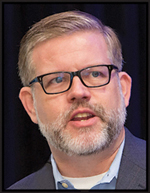2018 School Spending Survey Report
The State(s) of National Advocacy | Federal Advocacy
Since its founding in 2012, EveryLibrary, the only political action committee (PAC) for libraries, has mainly focused on helping libraries win elections for local funding levies, building and operating referenda, and independent taxing districts—the bread and butter of American library support at the local level. But the threat to national funding demanded a different approach.
 Since its founding in 2012, EveryLibrary, the only political action committee (PAC) for libraries, has mainly focused on helping libraries win elections for local funding levies, building and operating referenda, and independent taxing districts—the bread and butter of American library support at the local level. But the threat to national funding demanded a different approach. Yet even—or especially—when fighting on the nationwide stage, EveryLibrary has not abandoned its local front. Rather, it has capitalized on its strength by developing four or five state-level campaigns that would “localize the message” about the impact of federal funding on that state’s libraries, EveryLibrary executive director (and 2014 LJ Mover & Shaker) John Chrastka tells LJ. Localization is important, he says, because “some people take action based on just the idea of libraries, but other people take action because there’s going to be some diminishment of their local communities.”
Since its founding in 2012, EveryLibrary, the only political action committee (PAC) for libraries, has mainly focused on helping libraries win elections for local funding levies, building and operating referenda, and independent taxing districts—the bread and butter of American library support at the local level. But the threat to national funding demanded a different approach. Yet even—or especially—when fighting on the nationwide stage, EveryLibrary has not abandoned its local front. Rather, it has capitalized on its strength by developing four or five state-level campaigns that would “localize the message” about the impact of federal funding on that state’s libraries, EveryLibrary executive director (and 2014 LJ Mover & Shaker) John Chrastka tells LJ. Localization is important, he says, because “some people take action based on just the idea of libraries, but other people take action because there’s going to be some diminishment of their local communities.”  Supported by Gale Cengage, EveryLibrary has partnered with California, Mississippi, South Carolina, and Washington State—plus the American Indian Library Association, which represents Native Hawaiian, Native Alaskan, and tribal libraries around the United States, “which are a very key component of IMLS funds and haven’t gotten a lot of attention,” Chrastka explains. In each of those areas, in collaboration with the state library association, EveryLibrary worked with the state library to find “the particular programs that would be negatively impacted or cut” by a loss of federal funding, such as veterans services in California, backbone Internet connectivity in Mississippi, homework help and database purchases in South Carolina, and homework help and prison libraries in Washington State. The keystone of the campaign, says Chrastka, is direct marketing through social media, which urges potential signatories to saveIMLS.org, where they can use a third-party service to create personalized email to their congressional representatives. This has been supplemented by a direct mail postcard campaign in Washington and robocalls in California and Washington. At press time, EveryLibrary was targeting states where members of the congressional delegation serve on a relevant appropriations committee. “When it comes to an appropriation process, the local constituents for those members of Congress have an outsize voice,” Chrastka explains, and concentrating on that smaller pool allows the organization to make more impact for its advertising dollars.
Supported by Gale Cengage, EveryLibrary has partnered with California, Mississippi, South Carolina, and Washington State—plus the American Indian Library Association, which represents Native Hawaiian, Native Alaskan, and tribal libraries around the United States, “which are a very key component of IMLS funds and haven’t gotten a lot of attention,” Chrastka explains. In each of those areas, in collaboration with the state library association, EveryLibrary worked with the state library to find “the particular programs that would be negatively impacted or cut” by a loss of federal funding, such as veterans services in California, backbone Internet connectivity in Mississippi, homework help and database purchases in South Carolina, and homework help and prison libraries in Washington State. The keystone of the campaign, says Chrastka, is direct marketing through social media, which urges potential signatories to saveIMLS.org, where they can use a third-party service to create personalized email to their congressional representatives. This has been supplemented by a direct mail postcard campaign in Washington and robocalls in California and Washington. At press time, EveryLibrary was targeting states where members of the congressional delegation serve on a relevant appropriations committee. “When it comes to an appropriation process, the local constituents for those members of Congress have an outsize voice,” Chrastka explains, and concentrating on that smaller pool allows the organization to make more impact for its advertising dollars.  In addition to direct-to-voter outreach, EveryLibrary is working with towns in certain states that have government relations departments as part of the municipality, training librarians to convince their local lobbyists to include IMLS as part of their quality of life portfolio, so the message is “amplified and triangulated through local channels.” EveryLibrary is also providing government relations support to state association members and support for media relations, sending pitch letters to news outlets with large circulation in those states and providing media training to directors and library outreach staff on how to create their own pitch letters and press releases. “We’re looking to add capacity and long-term skill sets for their members as well as [in]the immediate crisis,” Chrastka says. Despite the disparity between levels of support for library funding by Democratic vs. Republican lawmakers [see, for instance, the blog post making the rounds on ALA’s Republican problem], Chrastka says there’s been no need to tweak the message to be effective with the residents of red or blue states. “There are compassionate points of engagement that the public has with library services that cross party lines,” says Chrastka. The ability to focus on only a few states is temporary—once the appropriations committee process is over, Chrastka points out, the fight “moves back to the congressional delegations across the country.” For librarians in those other 46 states looking to gear up for that next battle, Chrastka recommends going “directly to the IMLS state profiles page to get educated and informed about the breadth of state library services that are LSTA funded and then see how that leverages or fills in a gap in what [you] do.” Then write an op-ed piece for the local newspaper about the results.
In addition to direct-to-voter outreach, EveryLibrary is working with towns in certain states that have government relations departments as part of the municipality, training librarians to convince their local lobbyists to include IMLS as part of their quality of life portfolio, so the message is “amplified and triangulated through local channels.” EveryLibrary is also providing government relations support to state association members and support for media relations, sending pitch letters to news outlets with large circulation in those states and providing media training to directors and library outreach staff on how to create their own pitch letters and press releases. “We’re looking to add capacity and long-term skill sets for their members as well as [in]the immediate crisis,” Chrastka says. Despite the disparity between levels of support for library funding by Democratic vs. Republican lawmakers [see, for instance, the blog post making the rounds on ALA’s Republican problem], Chrastka says there’s been no need to tweak the message to be effective with the residents of red or blue states. “There are compassionate points of engagement that the public has with library services that cross party lines,” says Chrastka. The ability to focus on only a few states is temporary—once the appropriations committee process is over, Chrastka points out, the fight “moves back to the congressional delegations across the country.” For librarians in those other 46 states looking to gear up for that next battle, Chrastka recommends going “directly to the IMLS state profiles page to get educated and informed about the breadth of state library services that are LSTA funded and then see how that leverages or fills in a gap in what [you] do.” Then write an op-ed piece for the local newspaper about the results. RELATED
RECOMMENDED
TECHNOLOGY
ALREADY A SUBSCRIBER? LOG IN
We are currently offering this content for free. Sign up now to activate your personal profile, where you can save articles for future viewing









Add Comment :-
Comment Policy:
Comment should not be empty !!!